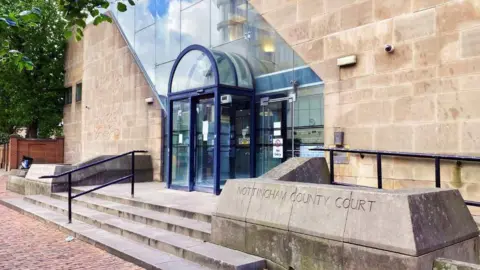
A former PhD student has been found guilty of conspiring to commit female genital mutilation in a case described as a "landmark."
Emad Kaky arranged for a young girl to travel from the UK to Iraq, where she would have been subjected to FGM and also forced into marriage.
The Crown Prosecution Service (CPS) said the FGM conviction was the first of its kind in England and Wales.
Kaky, who lived in Nottingham at the time of the offences, was found guilty at Nottingham Crown Court on Monday.
The 47-year-old will be sentenced at the same court on 3 October.
Janine McKinney, chief crown prosecutor for CPS East Midlands, said: "Female genital mutilation is a horrific crime to subject anyone to – let alone a child.
"There was clear evidence that Emad Kaky had intended for this young girl to suffer incredible harm and to be forced into an illegal marriage she would have had no ability to resist at such a young age.
"This landmark case sends a strong message to offenders of this sickening crime. Just because an offence has been committed somewhere else in the world, does not stop you facing prosecution.
"We will explore every avenue in our pursuit to get justice for victims, wherever our legal test is met."

Kaky was convicted of two offences at Nottingham Crown Court
Kaky, who now lives in Swansea in Wales, was found guilty of two charges - forced marriage and conspiracy to commit FGM.
The CPS said his plans were uncovered by a witness who arranged for the victim to travel back to the UK, and reported Kaky to the police.
Prosecutors presented evidence that showed Kaky had booked and paid for the trip to Iraq while living in Nottingham.
The CPS said messages retrieved from his phone showed Kaky intended for the victim to be subjected to FGM and forced into marriage.
’Unacceptable practice’
FGM has been a criminal offence in England and Wales since 1985.
The CPS said this was the third FGM conviction in England and Wales, but the first time a person had been convicted of conspiracy to commit FGM.
Jaswant Narwal, CPS national lead for "honour"-based abuse, female genital mutilation and forced marriage, said FGM was "a form of violence against women and girls".
"There are many complexities involved in prosecuting this type of offending, which can be committed in close-knit communities, historically, and abroad, but this is no barrier to the CPS prosecuting wherever our legal test is met," she said.
"We are clear there is no place for this unacceptable practice in society.
"We will continue to work tirelessly with our partners to safeguard and support victims of FGM and bring perpetrators to justice."
Read more similar news:
Comments:
comments powered by Disqus
































